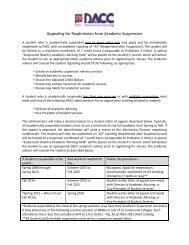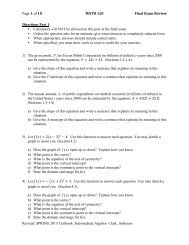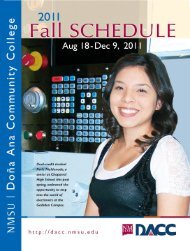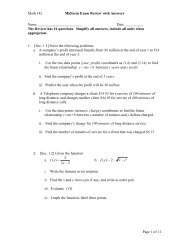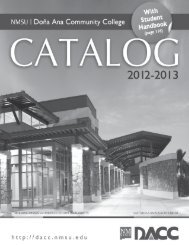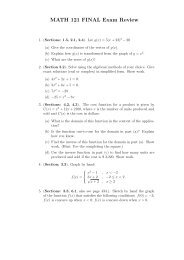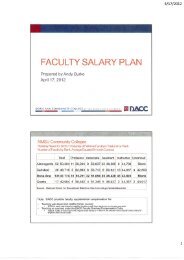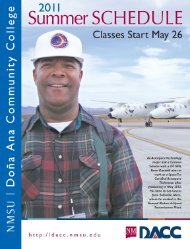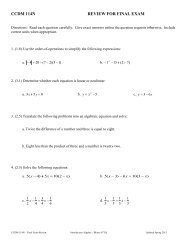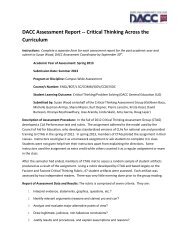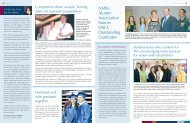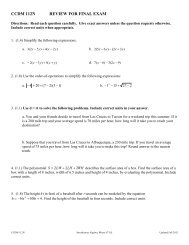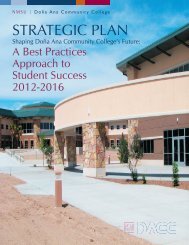online - Dona Ana Community College - New Mexico State University
online - Dona Ana Community College - New Mexico State University
online - Dona Ana Community College - New Mexico State University
You also want an ePaper? Increase the reach of your titles
YUMPU automatically turns print PDFs into web optimized ePapers that Google loves.
perhaps some surgery. They may want to specialize for work in periodontics,<br />
oral and maxillofacial surgery, pedodontics, or orthodontics.<br />
In the state of <strong>New</strong> <strong>Mexico</strong>, dental assistants can become certified<br />
to perform the following expanded duty tasks: radiology (taking x-<br />
rays), coronal polishing (polishing of teeth and removal of stains),<br />
fluoride treatments (the act of placing fluoride on a patient’s teeth),<br />
and sealant placement (used to prevent decay). These certifications<br />
are obtained through the <strong>State</strong> Dental Board and are a portion of the<br />
Dental Assisting National Board Certification Exam.<br />
The Dental Assistant program at DACC is nationally accredited by<br />
the American Dental Association, Commission on Dental Program<br />
Accreditation. It is also recognized by the <strong>New</strong> <strong>Mexico</strong> <strong>State</strong> Board<br />
of Dentistry as a continuing-education provider.<br />
Program Admission Special Requirements<br />
The Dental Assistant program is a limited-entry, special-application<br />
program. When a candidate is considered for acceptance into the<br />
program, the following factors are taken into account:<br />
• High school and/or college transcripts and GPA<br />
• Health Occupations Basic Entrance Test (HOBET) scores<br />
• Proof of residence<br />
• Copy of current health care provider CPR card and immunizations<br />
• Completion of ENGL 111G and computer literacy course—required<br />
prior to applying (completion of other general education<br />
and related requirements also considered)<br />
• Completion of program application (submitted before deadline)<br />
Certificate (45 credits)<br />
NOTE: Courses preceded by an asterisk (*) must be completed before<br />
a student can apply to the Dental Assistant program. Courses<br />
appearing in italics may be applied toward a bachelor’s degree at<br />
NMSU.<br />
OR<br />
OR<br />
OR<br />
OR<br />
Core Requirements<br />
11 credits<br />
*ENGL 111G, Rhetoric and Composition 4<br />
*OECS 101, Computer Basics 1–3<br />
*OECS 105, Intro. to Microcomputer Technology<br />
*C S 110, Computer Literacy<br />
OEHO 101, Comm. for Health Care Students 3<br />
COMM 253G, Public Speaking<br />
COMM 265G, Prin. of Human Commun.<br />
PSY 201G, Introduction to Psychology 3<br />
Related Requirements<br />
3 credits<br />
OR<br />
OEHO 225, Nutrition for Health Occupations<br />
HNFS 163, Nutrition for Health<br />
3<br />
NOTE: Although OEHO 225 lists additional prerequisites/<br />
corequisites, these are not required by the Dental Assisting program.<br />
Technical Requirements<br />
31 credits<br />
OEDA 111, Biodental Science 4<br />
OEDA 113, Dental Assisting I 4<br />
OEDA 115, Dental Radiology 3<br />
OEDA 117, Dental Materials 3<br />
OEDA 121, Dental Assisting II 4<br />
OEDA 123, Dental Assisting Practicum 6<br />
OEDA 125, Professional Concepts 3<br />
OEDA 127, Dental Office Management 2<br />
OEDA 129, Preventive Dentistry 2<br />
Dental Hygiene Program*<br />
Associate in Applied Science Degree<br />
528-7216 (*program is pending final approval)<br />
A dental hygienist is a vital member of a team of dental professionals<br />
dedicated to improving oral health and supporting the general<br />
health of individuals and groups. As licensed professionals, dental<br />
hygienists provide educational, clinical, and therapeutic services<br />
and may be involved in research, administration, client/patient advocacy,<br />
marketing or consulting. Dental hygienists may practice in a<br />
variety of settings such as private dental offices, public health facilities,<br />
schools, nursing homes and hospitals. They may also work in<br />
correctional facilities, business and industry and other settings.<br />
Dental hygienists in a clinical setting perform oral and general<br />
health assessments such as: medical history, vital signs, oral cancer<br />
screening, dental charting, examination of the gums and supporting<br />
structures of teeth. They provide oral health instruction, counseling<br />
regarding nutrition and healthy lifestyle and their impact on oral<br />
and general health. Dental hygienists take and interpret radiographs<br />
and provide many types of preventive services such as removing<br />
deposits from teeth, applying fluoride, placing sealants and more.<br />
Infection control and emergency management are also important<br />
functions. In <strong>New</strong> <strong>Mexico</strong> and other states, dental hygienists may be<br />
certified to provide local anesthesia.<br />
Dental hygienists enjoy working with people, have good manual<br />
dexterity and enjoy working with their hands. They possess the maturity<br />
and critical thinking skills to provide current, quality, professional<br />
care. They have strong interpersonal skills to motivate and<br />
educate patients of all ages. Dental hygienists are life-long learners<br />
and are dedicated to continuing education, enhancing the profession<br />
and practicing ethical decision-making and behavior.<br />
Dental hygienists are generally well paid and are highly thought<br />
of as professionals in their communities. The profession is one of<br />
the fastest growing occupations in the country and is expected to<br />
grow much faster than average for all occupations through 2014.<br />
The number of people seeking preventive dental hygiene care, the<br />
expansion of an older population who retain their teeth, and a trend<br />
in group practices that stress effective and productive use of office<br />
personnel, will provide increasing opportunities for employment.<br />
Graduation from this program qualifies students to take national and<br />
state examinations to become a licensed dental hygienist anywhere<br />
in the United <strong>State</strong>s and there are international employment opportunities<br />
for dental hygienists educated in the U.S.<br />
This is a limited entry program. Criteria for selection are available<br />
from the program director. Student faculty ratio in the clinical setting<br />
is 1-6 thus allowing for individualized instruction.<br />
Students wishing to pursue a Bachelor’s degree should consult with<br />
an advisor regarding transferability of courses in the prerequisite list<br />
as well as the dental hygiene curriculum.<br />
2 0 0 7 - 2 0 0 8 C A TA L O G<br />
37



